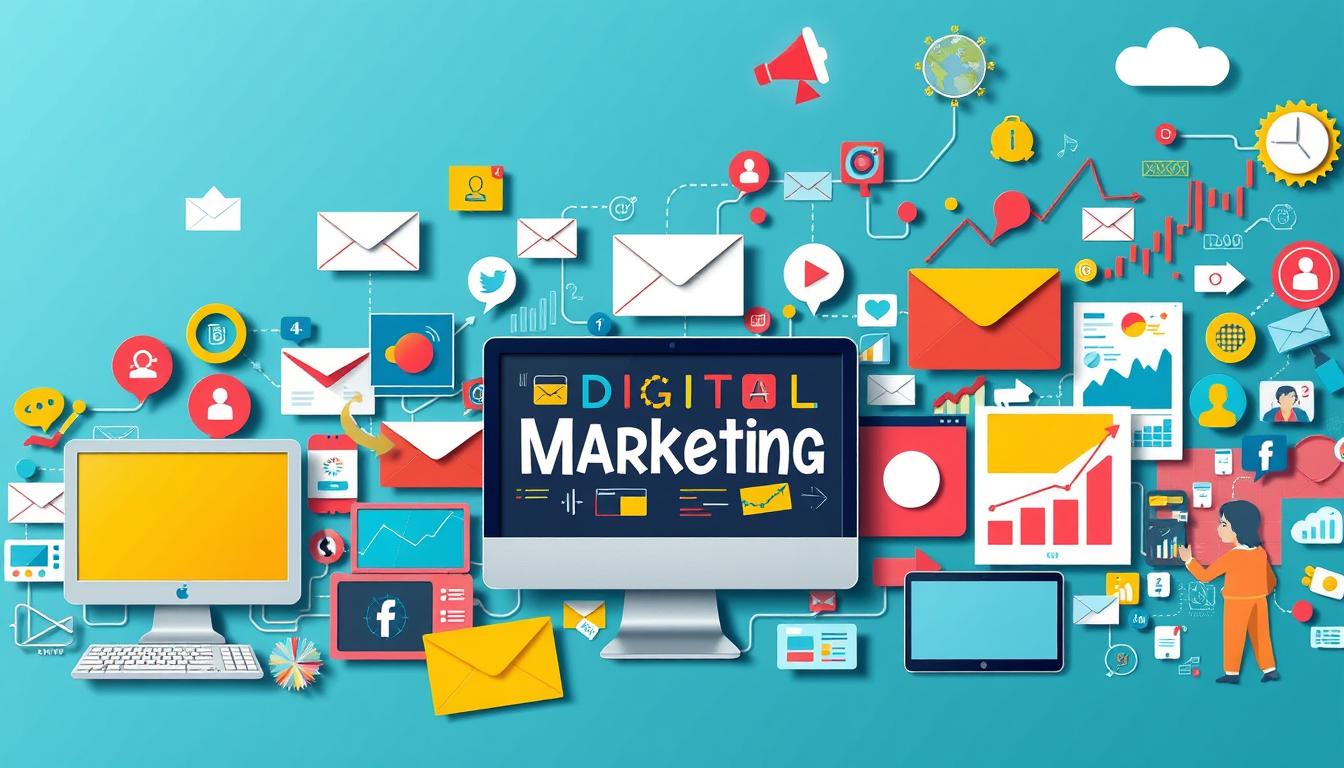Last Updated on December 9, 2025
In today’s fast-paced business landscape, grasping the evolution of digital marketing is crucial. This field covers a broad spectrum of strategies aimed at promoting products and services online. It allows companies to effectively reach their target audience. As traditional marketing methods lose ground, businesses are increasingly turning to digital marketing to connect with their audience in new, innovative ways.
It’s vital to stay ahead; by 2024, AI and automation will significantly impact digital marketing. They will deliver highly personalized experiences and automate many marketing tasks. This marks a pivotal change in digital marketing history, altering how brands interact with their customers.
This article delves into the complex world of digital marketing trends, tracing its development from its early beginnings to today’s advanced strategies. You’ll discover how past advancements shape current tactics and how to apply these insights to boost your marketing efforts.
Key Takeaways
- Digital marketing encompasses various channels, such as social media, SEO, and email marketing.
- AI and automation will significantly improve marketing personalization by 2024.
- Short-form videos and live streaming will become prominent in content trends soon.
- Adopting privacy-first strategies is vital to comply with laws like GDPR and CCPA.
- Voice search optimization is key to enhancing visibility and engagement.
What is Digital Marketing?
Digital marketing is a revolutionary way for businesses to connect with customers through electronic media. It uses various digital channels to promote products and services effectively. These channels include social media, websites, and email, each offering unique benefits that enhance engagement and conversion rates.
The definition of digital marketing goes beyond just advertising. It encompasses a broad spectrum of strategies such as Search Engine Optimization (SEO), content marketing, and social media marketing. This comprehensive approach allows businesses to reach their target audience where they are most active: online.
Consumer behavior has undergone a significant shift with the advent of the internet. More people now prefer to shop online rather than in physical stores. This change has created new opportunities for marketers to engage with a wider audience using personalized messages.
One of the key benefits of online marketing is the ability to track campaign performance in real-time. With data-driven insights, businesses can adjust their strategies on a daily basis. This ensures optimal budget utilization and maximizes returns. It allows small businesses to compete with larger corporations effectively, making digital marketing essential in today’s market.
History of Digital Marketing
The history of digital marketing dates back to the 1990s, a crucial era as the internet’s popularity surged. Initially, there was doubt about the effectiveness of online strategies. However, the introduction of the first clickable banner ad in 1994 marked a significant turning point. This event heralded the start of a new era in advertising, setting the stage for its eventual dominance.
As Yahoo! and Google emerged in the late 1990s, marketers began to explore how to utilize these search engines effectively. This period had a profound impact on the digital marketing evolution we see today.
In the 2000s, the marketing landscape continued to evolve, with a focus on optimizing for mobile platforms. This decade saw the rise of various marketing channels over time, including SEO, email marketing, and social media platforms like MySpace, LinkedIn, Facebook, and Twitter. As digital devices became more widespread, brands had to adapt to connect with consumers through new channels.
By the 2010s, video marketing and influencer marketing started to gain traction, further evolving marketing strategies. Consumers became increasingly connected, leading to a greater reliance on online interactions when making purchasing decisions. Recent figures suggest that about 70% of retail purchases in the U.S. are influenced by online brand interactions. The growth of digital marketing reflects a shift from traditional advertising to a digital-centric environment.

Key Milestones in Digital Marketing Evolution
The evolution of digital marketing has profoundly altered how businesses engage with consumers. In 1994, clickable banner ads on HotWired.com marked the beginning of online advertising. This was the start of numerous digital marketing advancements. The launch of Google in 1998 brought search engine optimization (SEO) to the forefront, setting the stage for future digital marketing strategies.
Google AdWords in 2000 revolutionized pay-per-click (PPC) advertising, a pivotal moment in digital marketing history. It allowed companies to boost their visibility while controlling their ad spending effectively. As digital platforms became more prevalent, significant shifts in digital marketing occurred. Social media began to dominate, with MySpace and Facebook enabling brands to interact directly with their audience in a more personalized manner.
Technology’s advancement made personalization crucial, especially with the introduction of cookies in 2006. These allowed for targeted ads based on user behavior. This shift highlighted a more strategic approach to drawing in and engaging consumers, underscoring the ongoing evolution of digital marketing.
The emergence of social media influencers marks an exciting trend in digital marketing. With over 170 million people using social media, and Facebook being a key platform for 99% of digital marketers, this channel remains vital for building customer connections.
Reflecting on these digital marketing milestones, it’s clear that technology’s impact is profound. AI-driven tools like chatbots are now integral, offering personalized interactions and shaping the future of digital marketing.
Digital Marketing Trends
Keeping up with digital marketing trends is vital for businesses aiming to succeed. As consumer habits change and technology evolves, brands must adjust their tactics to stay ahead. Social media, email marketing, and SEO are pivotal in shaping these trends.
Social Media Marketing
Social media platforms such as Instagram and TikTok have revolutionized how brands interact with their audience. Short-form videos now dominate, especially among Gen Z. Brands that use social listening and conversational marketing can create campaigns that go viral. Analytics and insights from these platforms help refine strategies over time.
Email Marketing Trends
Email marketing remains powerful with personalized messages. In 2023, customized emails help brands connect deeply with their audience, boosting engagement. This trend highlights the importance of targeted campaigns that respect individual preferences. Companies that leverage data-driven insights in email marketing see better subscriber connections, leading to increased loyalty and repeat business.
SEO Strategies and Their Progression
SEO has seen major shifts as search engines prioritize user experience. Google now values content that answers user queries over just keywords or backlinks. Adapting means understanding the role of zero-click searches and optimizing content for them. With growing competition, a robust SEO strategy is crucial for online success and expansion.
The Role of Technology in Digital Marketing
Technology is revolutionizing digital marketing strategies. Understanding the roles of AI in marketing and mobile marketing strategies is crucial. These advancements allow marketers to target content better, measure performance effectively, and engage customers innovatively.
Artificial Intelligence in Marketing
AI in marketing has transformed how businesses interact with customers. Machine learning and big data facilitate personalized advertising, ensuring messages reach the correct audience. AI analyzes large datasets to understand audience behavior and preferences, enhancing engagement and conversion rates. Chatbots provide instant support, improving customer service and creating a personalized experience that keeps users interested. For deeper insights, explore this detailed look at technological trends. Dynamic content is vital; it helps brands tailor their messages to user behavior, increasing the likelihood of connecting with potential customers.
Mobile Marketing Strategies
As more consumers use mobile devices, effective mobile marketing strategies are essential. Mobile optimization ensures your marketing works well on smartphones, focusing on user-friendly designs, quick loading times, and engaging content. Location-based marketing offers brands chances to connect with customers at opportune moments. Social media platforms now integrate shopping features, opening new ways for direct customer interaction. Adopting a mobile-first strategy means your campaigns can keep up with the shift to mobile, leading to better conversion rates and ROI.
Types of Digital Marketing
Digital marketing involves a variety of strategies aimed at engaging different audiences. It’s essential to grasp these types to craft an effective marketing plan. Key strategies include:
- Content Marketing: This approach centers on creating valuable content to draw in and keep customers. With 83% of marketers prioritizing quality over quantity, producing high-quality content is crucial.
- Social Media Marketing: Platforms such as Facebook, Instagram, and TikTok are key for connecting with your audience. The social media ad market is expected to hit $207.10 billion in 2023, underscoring its importance in marketing.
- SEO: SEO is vital for boosting website visibility. As younger consumers increasingly search for products on social media, SEO must evolve to stay relevant.
- Email Marketing: Email marketing is seeing a comeback, with companies investing more in it. When executed well, email campaigns can effectively target specific groups.
- Influencer Marketing: This method uses social media influencers to promote products. The influencer marketing industry is forecasted to grow to about $21.1 billion in 2023.
Each strategy plays a unique role in enhancing brand awareness and driving conversions. A comprehensive marketing strategy should integrate these elements for a cohesive approach.

Challenges in Implementing Digital Marketing Strategies
Effective digital marketing strategies come with numerous challenges in digital marketing that businesses must overcome. The need to adapt to rapidly changing technologies and consumer preferences is a major hurdle. Over 80% of businesses find it hard to keep up with platforms like programmatic advertising, as traditional methods lose their effectiveness.
Identifying which fast-changing trends are worth investing in is another significant challenge. About 65% of marketers struggle to allocate time and resources effectively among these trends. This uncertainty can hinder progress and disrupt marketing strategies.
For small businesses, competition is a major digital marketing difficulty. 70% of them feel at a disadvantage against larger brands due to limited resources and budgets. These disparities can significantly affect their online visibility and overall success.
Measuring the return on investment (ROI) is another critical issue. Up to 60% of businesses find it challenging to optimize their marketing budgets while accurately tracking and analyzing data. These complexities can hinder informed decision-making and result in misallocated resources.
- Data breaches have increased by 45%, raising privacy concerns that deter customers from engaging with brands.
- Approximately 75% of businesses face unpredictable buying behavior, complicating their understanding of user actions and conversion factors.
- Over 70% struggle with mobile-forward advertising strategies, highlighting the need for seamless user experiences across devices.
- Many businesses report challenges in developing effective content strategies and crafting compelling ad copy that resonates with their target audience.
These obstacles to effective digital marketing require businesses to be agile and innovative in their approaches. By acknowledging these challenges and proactively addressing them, organizations can improve their chances of success in a competitive digital landscape.
Future of Digital Marketing
The digital marketing landscape is undergoing rapid evolution, driven by several critical factors. It’s crucial to monitor the emerging digital marketing strategies that are transforming how brands engage with consumers. In 2024, a significant 56% of U.S. consumers reported purchasing products after seeing ads on platforms like TikTok. This highlights the critical role of incorporating video content into your marketing plans, given that nearly 86% of Americans watch online videos regularly.
The global online shopping population is projected to hit 2.14 billion, underscoring the need to leverage these emerging digital marketing trends. For example, 42% of social media users turn to these platforms to discover new products, underscoring the importance of a strong social media footprint. TikTok’s anticipated growth to 1.8 billion users further cements its position as a key influencer in reaching potential customers.
- Influencer marketing is poised for increased prominence, with 49% of consumers valuing recommendations from influencers.
- Multi-channel strategies will become essential as you broaden your reach across platforms like Instagram, Facebook, and LinkedIn.
- Short-form video content will play a pivotal role in enhancing brand visibility and engagement, especially on TikTok.
Experts predict a surge in the adoption of AI for personalized marketing, which will enable hyper-targeted messaging. Additionally, as companies invest more in programmatic advertising, integrating AI algorithms can significantly boost conversion rates.
Interactive content, such as quizzes and polls, will be pivotal in strengthening brand connections. Given the current shifts in cookie tracking, it’s vital to adapt to these changes to ensure effective ad delivery. Your strategy must reflect these future trends in digital marketing to stay relevant and forge genuine connections with your audience.
Conclusion
The summary of digital marketing evolution shows a path of ongoing innovation and adaptation. It began with the emergence of social media and has now reached the integration of artificial intelligence. Each step has been crucial in shaping how businesses interact with their audiences. For any brand, grasping the importance of digital marketing trends is key to success in today’s competitive world.
The future of marketing looks set to be even more transformative. Artificial intelligence will continue to change strategies, offering personalized recommendations and enhancing customer interaction through chatbots. Trends like voice search optimization and interactive content will also gain prominence as consumers demand more personalized experiences. Staying updated with these trends will help keep your marketing strategies effective and relevant.
Success in digital marketing hinges on building real connections with your audience. Offering value while protecting consumer privacy builds trust and loyalty. By using insights and embracing both current and emerging technologies, you can secure long-term success. This is vital in a fast-evolving market.








